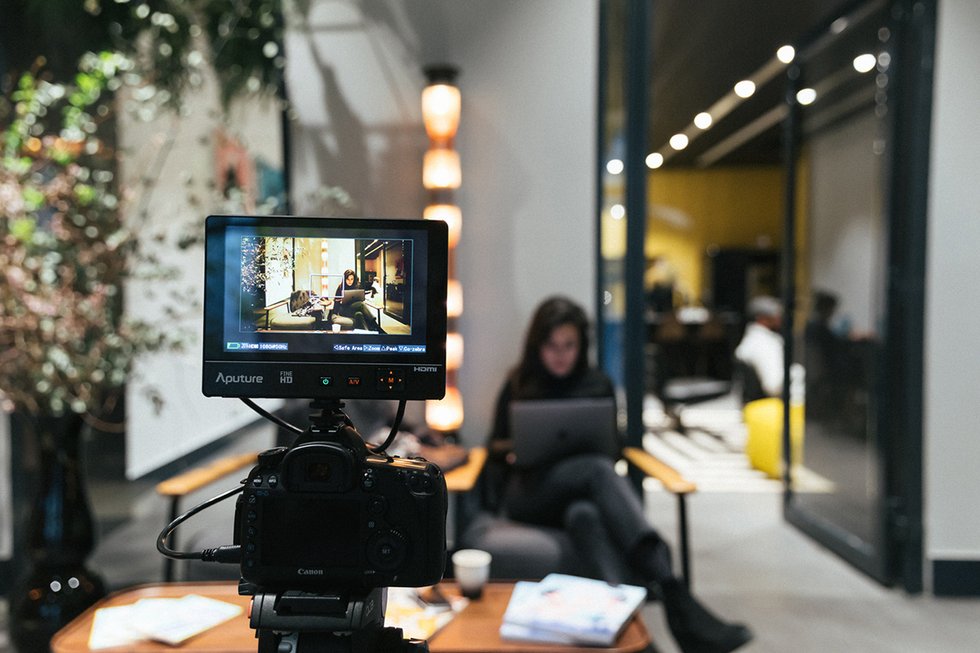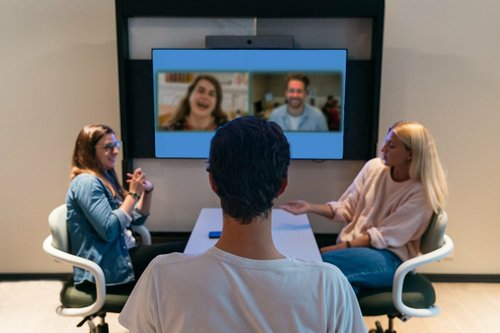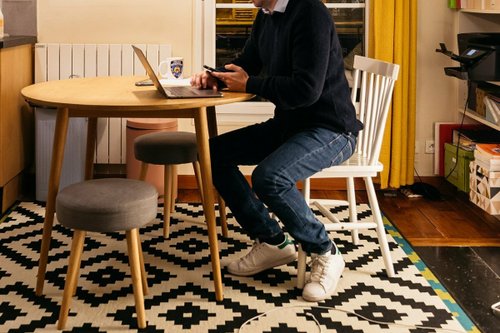What to expect from a pre-recorded job interview
May 15, 2020
9 mins

CN
Fondatrice de Dea Dia
Pre-recorded job interviews are being used more and more as a tool in the recruitment industry to save time and to select candidates for the next stage: face-to-face interview. But how does this format work? How are you supposed to prepare for it and make the most of the process?
To find out, we interviewed Julia Moutet, a human resource development manager, and Julie Atlan, a senior content manager, who both work for Easyrecrue, a recruitment platform that specializes in pre-recorded interviews. They explained how the process works and gave us some advice on how to do well at it. Kathleen, who had one of these interviews when she was looking for work, told us how she found the experience.
What is a pre-recorded interview?
As the name suggests, it is a job interview that is filmed in advance and is then watched by a recruiter afterward. As a candidate, you are asked to connect to a platform, which then remotely records your interview. You are alone in front of the camera and you are asked several questions which have been pre-recorded, so there is no actual interaction with a recruiter. After you get to the end of the interview, the recruiter will receive the video.
How does it work in practical terms?
After publishing a job offer, a recruiter will receive several resumes. They then sort through the applicants and select those who they would like to have a pre-recorded interview with. The interviews are carried out on a platform that is either available in a desktop format or via a mobile or tablet application. If your resume is selected, you receive an email with an invitation from the recruiter asking you to connect to the platform or to download the application and log yourself in. As soon as you click on the link, your interview will begin.
Once you have logged in, microphone and camera tests are performed to make sure that they are working. Then you are given a written or a visual practice question to answer. Atlan said, “Do not underestimate that first question, because seeing yourself on screen is not always straightforward and it can take a moment to get used to it. The candidate will get more comfortable as the interview progresses.”
All of the interview questions will have been devised by the recruiters. They decide how long the interview should last and the direction it should take. Moutet said, “The recruiter sets up the interview. They choose the questions, their format—whether they are written, appear on the screen, or are filmed—how they would like them to be answered, and the allotted time for each question. There may also be scenarios, some multiple choice questions, or written responses may be required. They might also give the candidate some specific instructions, such as to wear a suit for example, for the recording.”
After you have completed the interview and it has been saved, the recruiter will then receive it and can watch it anytime and as often as they like with the team involved in the process. Successful candidates will be invited into the office for a standard job interview.
A screening tool
This is a pre-selection interview that allows recruiters to go through the recruitment process faster and therefore gives them a more qualitative approach to the selection of applicants. Atlan said, “You can’t compare pre-recorded interviews with traditional job interviews. They cannot replace them; they occur before them. They are an alternative to preselection telephone interviews that takes place after handing in your resume and before an actual face-to-face meeting.”
Most of the time, the interview is geared towards finding out more about the candidate before meeting them. Moutet said, “The idea is that the candidate will get to introduce themselves, and talk about where they are career-wise and their professional experience. They also get to convey what they have understood about the position they have applied for or the responsibilities that they think it will entail. Then there may be a few practical questions about availability and salary expectations, which can usually be answered in writing.”
She added, “Some recruiters include questions to determine a candidate’s true skills in a language or software, for example, to help them choose the right person. There may be questions in French, for example, to gauge whether the candidate is comfortable answering in that language. In general, there are no trick questions, the idea is just to learn more about the candidate.”
A tool for testing motivation
It is mainly a screening tool that helps to reduce the number of candidates invited for a traditional job interview, but for Atlan and Moutet, it also allows them to assess a candidate’s motivation levels. Moutet said she believes the format “is a good way of testing a candidate’s motivation and whether they cope when they are taken out of their comfort zone. Those who really want the job will pluck up the courage to do a pre-recorded interview.” A word to the wise!
The benefits of this kind of interview
You can choose your interview conditions
The first advantage is the amount of freedom this kind of interview gives you over the more traditional HR phone call. You get to choose the time and the place for your interview. You could do it on your mobile, a tablet, or on a computer at the right time for you. You simply have to respect the deadline set by the employer. You will often get a few days to complete the process, which is a real bonus if you have another job or have a busy schedule and are not available during office hours.
Atlan said, “It allows you to do your interview in the best conditions possible. The candidate is given a time limit in terms of responding to the invitation. They get to choose the time and place. They can do it whenever they would like to. It can be in the evening or at the weekend if they like—not to mention the fact that they are given 30 seconds after every question to think about their answer, which is not an option when it’s done on the telephone.”
It saves time
There is no need to be available at a specific time or place and the interview won’t be canceled at the last minute, which can happen in other circumstances. So, you are in control of your schedule. Kathleen particularly appreciated this. She said, “The interview took me a lot less time than a conventional one because there was no interviewer, no dialogue, and no exchange. Everything was recorded onto some software. It took about 20 minutes.”
It increases your chance of being selected
Conducting interviews is a long and time-consuming task for recruiters. Therefore, they tend to be harsh when screening candidates, so that those they choose to meet will have appropriate profiles. Pre-recorded video interviews allow them to save time and as a consequence lets them select more candidates.
Atlan said, “The recruiter saves time when they watch the videos because on average they are twice as fast as telephone interviews. So, they can invite even more candidates and extend the scope to those who may not have ordinarily made it past the resume stage of the process.”
At the same time, the video can be viewed repeatedly. So if the recruiter gets interrupted or distracted while they are watching it, they can watch it again, which is also not an option when it’s an HR phone call.
It boosts the chances of atypical candidates
A video format can help certain candidates by allowing them to compensate for any shortcomings on their resume with their personality and soft skills. Moutet said,“Atypical candidates – those who lack experience or did not go to the right school – can promote and express themselves more freely. We can see their posture, hear their vocabulary and the terminology they use, see their demeanor in front of a camera, and the way they express themselves. It is more genuine than a phone call and lets you see things you would not be able to detect from a resume.”
According to Moutet, it is undeniable that this process has allowed many candidates to get an interview, who typically would not have been selected. She experienced it when recruiting for Easyrecrue. “I remember, in particular, a seemingly well-trained rookie, who dazzled us in her video interview. We found her incredibly energetic, articulate, and smiley, so we decided to meet her face-to-face. This would have never happened if it weren’t for the video interview. And we get a lot of this kind of feedback from our clients.”
The candidate’s fears
Can a company make you do this type of interview?
No, they can’t make a candidate do one. On the other hand, it could indeed be a viable cause for concern if you back out: “Will I be excluded from the recruitment process if I refuse to do one?” In fact, if your profile perfectly matches the job description, there is a good chance that refusing will not stop you from getting to the next round of the recruitment process.
Moutet said, “If a candidate declines our invitation, but has a really interesting resume, we may still give them a chance to have a classic interview. This has happened once or twice internally. We have to be flexible. However, it does come down to the company’s HR policies. Some will overrule normal procedure and others might decide to stick to it and not go any further.”
Can you start again if you are not happy with the results?
Once again, it’s up to the recruiter to decide whether or not they will allow candidates to do so. Some prefer spontaneity but others will let you start again. Moutet said, “We do not recommend going back and re-recording anything because we would like it to be as natural as possible. It’s supposed to be a substitute for that first phone call, when you are on the phone you cannot delete what you have just said and start again! If you record the same bit two or three times, you will know what the question is in advance, so you will have a pre-prepared answer and it will no longer have the same impact.”
Recruiters often allow it anyway, she said. “They know that is a stressful and unsettling task, especially the first time, so offering people the opportunity to re-record it can be reassuring for the candidates.”
If the recruiter does not allow you to re-record answers, they may let you start the whole process from the beginning, especially if you freeze up completely. “We had a candidate who got in touch with us because he had completely messed up his pre-recorded interview and, depending on the person’s profile, we might send them another invitation,” said Moutet.
Being alone in front of a camera
Having no one in front of you can be an advantage or a disadvantage, depending on your personality. Those who fear tough interviews or recruiters who ask trick questions may find it easier to be given 30 seconds to think about their answers and not have to worry about supplementary questions. Moutet said, “There is no personal bias. You won’t come across a difficult character who you don’t hit it off with, since you will be alone in front of your screen.”
Despite all that, for some other candidates, the lack of interaction can be a problem. Kathleen, for example, felt that she was less spontaneous because there was no one in front of her and no interaction. “Personally, I prefer having someone before me, having a real exchange. You can tell if there is a connection or not. I find this format even more stressful because when you are in an interview, [you get a little stressed out anyway and therefore sometimes get flustered. A recruiter might be able to help, by steering you in the right direction, but when you are on your own in front of a camera and you get rattled, it’s a little more complicated getting back on track.”
A stressful and unsettling task
For many people, seeing yourself talking on screen is particularly unsettling. This is not surprising because when you are not used to doing this, you tend to focus on your appearance, judge yourself negatively and end up feeling disconcerted. But for Moutet, it’s just a question of getting used to it. “Candidates who are doing this for the first time often say it is ‘stressful’ and ‘unsettling’. But I am sure that if you asked candidates about their first-ever job interview, they would say the same thing. It’s just a matter of practice. Once you have done one or two of them, they just become a formality.”
What about your personal data?
How personal data is handled is an issue these days, especially in this kind of context. Candidates may worry about what will happen to their videos after the recruitment period. “Some people have made a point of telling us they do not want us to keep their videos. However, there is no chance of them coming out or of them being reused. As soon as a recruitment campaign ends—i.e. as soon as the position is filled —the video is archived and can no longer be assessed. We respect the law scrupulously.”
As a consequence, the recorded videos must be deleted after no more than two years and they can be shared with, downloaded by, or transmitted to recruiters only.
A pre-recorded interview may seem like an unsettling exercise at first, but it is no more difficult than the classic interview format that you are used to following. It should be seen as an opportunity for you to prove yourself, especially if you do not have the most appropriate resume for the position. If you are offered one by a recruiter, don’t let anxiety get in the way. Make your skill at this an advantage.
Translated by Mildred Dauvin
Photo: Welcome to the Jungle
Follow Welcome to the Jungle on Facebook, LinkedIn, and Instagram, and subscribe to our newsletter to get our latest articles every day!

More inspiration: Remote job interviews

‘I had a hybrid job interview — and it was a total nightmare!’
Arthur had one in-person interview and two by video call. He shares what was likely one of the worst moments in his professional life.
Jan 04, 2022

Six tips for a successful phone interview
You have 15 minutes to win the recruiter over the telephone. Here are six tips for a successful phone interview.
Mar 24, 2020

How to Prepare for a Video Interview
Landed a job interview via video with your dream company? Here are 5 tips on how to prepare for a successful video interview.
Nov 14, 2019
The newsletter that does the job
Want to keep up with the latest articles? Twice a week you can receive stories, jobs, and tips in your inbox.

Looking for your next job?
Over 200,000 people have found a job with Welcome to the Jungle.
Explore jobs